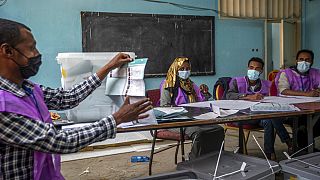Ethiopia
Ethiopians in Bahir Dar, capital of the Amhara region have shared their thoughts and hopes the day after the country voted in legislative and regional elections.
Some 38 million were registered to vote in Africa's second-most populous nation. But many must wait until September, with elections postponed or cancelled in one-fifth of national constituencies because of war, insecurity and logistical problems.
"I think this year's election is different from the previous one because many people registered to cast their vote from early in the morning to the evening. Secondly, it attracted so much media attention, more than before." Tadiwos Awoke, a businessman in Bahir Dar said.
Nevertheless, ballots were being tallied in the vast nation of 110 million, where results are not expected for several days.
Prime Minister Abiy Ahmed said Monday was "a historic day for Ethiopia".
"All sections of society have gone out to cast their voice in our nation's first free and fair election," the 44-year-old leader posted on Twitter, alongside images of crowds waiting to vote.
"Pictures are a thousand words and they show the earnestness, commitment to peace and the democratic process, by our people."
Abiy faced voters for the first time since coming to power in 2018, and his ruling party is expected to secure a comfortable majority.
Voting stretched into the evening, with the nearly 50,000 polling stations staying open an extra three hours to accommodate long queues after delays in delivering ballot papers.
"In politics, it is all about practising democracy and accepting the result. To whoever wins, whether NAMA (National Movement of Amhara) wins or the ruling Prosperity Party wins, we must welcome the result." says Eshete Alemnew a craftsman in Bahir Dar.
On Tuesday, vote-counting began.
In Bahir Dar, the capital of the northwestern Amhara region neighbouring Tigray, daily life had resumed with businesses open and traffic returning to the streets. When counting finished in a number of polling stations in the city on election day, results were displayed clearly for the public.
Prime minister Abiy called on all parties to remain calm and committed to peace during the tabulation phase until results are announced.
Once votes are counted, national MPs will elect the prime minister as well as the president, a largely ceremonial role.











01:08
Dancehall superstar Shatta Wale urges young people to back President Mahama
01:13
China and Ethiopia reaffirm alliance at meeting on sidelies of BRICS summit
01:09
Guinea presents draft for new constitution, referendum set for September
Go to video
Togo suspends French state-owned broadcasters RFI and France 24
Go to video
Protesters gather in Ivory Coast, demand Thiam's return on electoral list
01:07
Burundi’s ruling party wins all parliamentary seats amid fraud claims